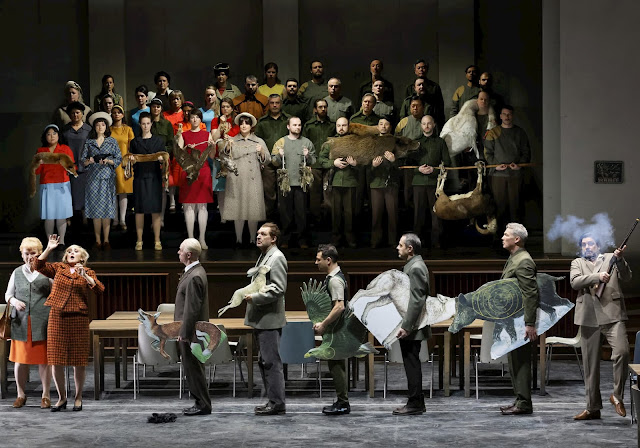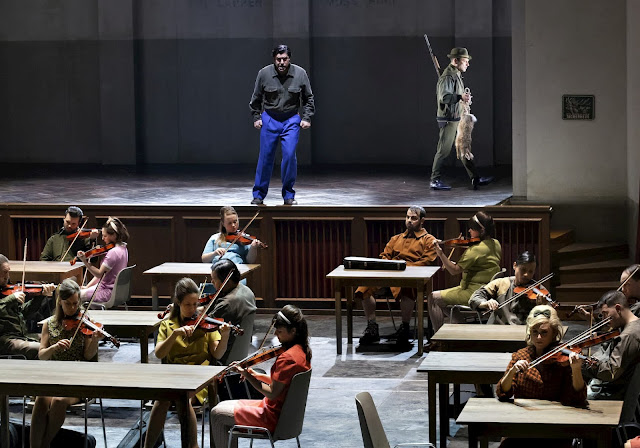 |
| Weber: Der Freischütz – The Wolf’s Glen Scene – Ilker Arcayürek, Manuel Winckhler – Opera Ballet Vlaanderen (Photo: Annemie Augustijns) |
Weber: Der Freischütz; Louise Kemény, Ilker Arcayürek, Rosemary Hardy, Thomas Jesatko, director: Christoph Marthaler, conductor: Stephan Zilias, Opera Ballet Vlaanderen; Opera Antwerpen
Reviewed 16 March 2025
A missed opportunity; strong musical performances redeemed the Swiss director’s self-indulgent staging, more theatrical event conceived by Marthaler based on Weber rather than a production of the opera itself.
Weber’s Der Freischütz remains a relative rarity on stages in the UK, despite the work’s iconic status. Its combination of Gothic romance with folk-inspired setting, so popular and influential at the time, renders the work tricky on modern stages, even before you consider the challenge of spoken dialogue. In German speaking countries the work has another reputation, as the first national opera, an important precursor at a time when the German nation as such did not exist. In Antwerp the opera, in Dutch translation, was the first work performed by the newly formed Flemish Opera in 1893, a company dedicated to countering the French-language programming prevalent in the city.
This is the somewhat complex history behind the staging of Weber’s Der Freischütz directed by Swiss theatre director Christoph Marthaler, a co-production between Theater Basel and Opera Ballet Vlaanderen. The production debuted in Basel in 2022 and arrived in Ghent and Antwerp earlier this year, we caught the performance in Antwerp on Sunday 16 March 2025.
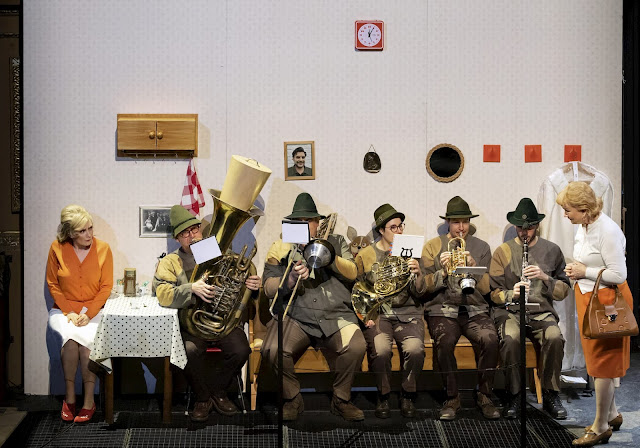 |
| Weber: Der Freischütz – Louise Kemény, Rosemary Hardy & stage band – Opera Ballet Vlaanderen (Photo: Annemie Augustijns) |
Ottokar was Karl-Heinz Brandt, Kuno was Raimund Nolte, Agathe was Louise Kemény, Ännchen was Rosemary Hardy, Kaspar was Thomas Jesatko, Max was Ilker Arcayürek, and the Hermit/Samiel was Manuel Winckhler. The cast was completed by two actors, Raphael Clamer and Peter Knaack. The conductor was Stephan Zilias, and the revival director was Joachim Rathke.
Marthaler’s explicit intention was to investigate the work’s iconic status. He was not interested in any of the Gothic romantic elements. When the curtain went up on part two, which began with the Wolf’s Glen Scene (which closes Act Two), we heard the orchestra singing the huntsmen’s chorus, then as the scene proper began the chorus on stage mimed playing violins. Effectively announcing the world turned topsy turvy, Marthaler’s theme for the second part of the evening.
The setting, designed by Anna Viebrock, was a modern day shooting club, effectively moribund and marooned in the past, with Der Freischütz presented almost as a ritual to be gone through, the dialogue spoken in a stilted manner. Marthaler’s new version of Friedrich Kind’s libretto included significant sections by others including Ulrich Holbein and Kafka. These disquisitions on hunting were largely delivered by two actors, Raphael Clamer as Kilian and Peter Kaack as the Greatest Hunter in the Black Forest. It was Clamer who brought the first half to a (deliberately) uncomfortable close with a speech about Gastarbeiter, made all the more squirm-making by the knowledge that the Max, Ilker Arcayürek, was himself born in Istanbul.
The production had many Regietheater ticks. A fondness for telling us what to think, and the sense that Marthaler felt he knew better than Weber and Kind, it was a production rather too full of its own cleverness. Marthaler was fond of repetition – the Hermit (Manuel Winckhler) repeatedly gave Louise Kemény’s Agathe flowers during ‘Leise, Leise’, the picture fell of the wall with monotonous and comic regularity, and the opening featured dialogue delibered slowly and seemingly on a repeat loop. just to emphasise the moribund nature of the shooting club. When Arcayürek began Max’s Act one aria, after some thirty minutes of repetitious dialogue, the effect was electrifying. Marthaler’s depiction of the shooting club as moribund was not reflected, thank goodness, in the musical performance thus creating something of mismatch.
A lyric tenor renowned for his lieder singing, Ilker Arcayürek was an ideal Max, a role historically given unnecessarily to heavier voices. His Act One aria was profoundly moving and this was indicative of the high musical standard of his whole performance with him bringing an appropriate heft along with sensitivity and care to Weber’s music. Dramatically, this Max was depicted as a rather bumbling figure, completely cowed in the Wolf’s Glen Scene.
Louise Kemény was recovering from a cold, but coped magnificently. Dramatically little was done, however, to alleviate the fact that Agathe is very passive, but Kemény made much of the musical side. And even recovering from a cold, she made moments like ‘Leise, Leise’ a real highlight.
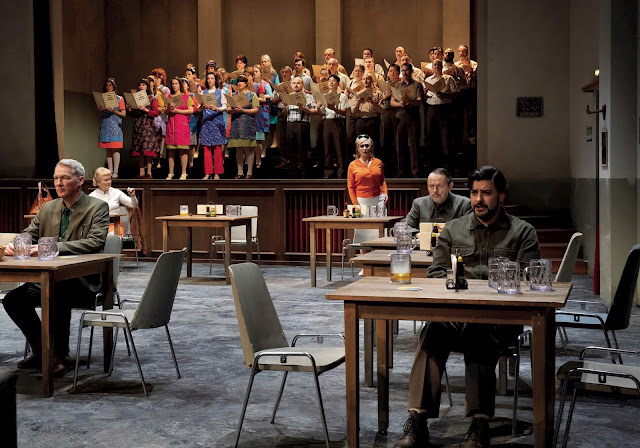 |
| Weber: Der Freischütz – Opening scene – Raimund Nolte, Rosemary Hardy, Louise Kemény, Peter Knaack, Ilker Arcayürek – Opera Ballet Vlaanderen (Photo: Annemie Augustijns) |
Rosemary Hardy’s Ännchen was very much an older woman (according the the Slipped Disc website, Hardy was 73 when she sang the role in Basel in 2022), her aria about the joys of young men given even more of a comic slant. This aria was one of the significant chunks of the opera presented in Titus Engel’s rearrangement for stage band (trumpet, trombone, tuba, clarinet, horn), an ensemble that played a significant musical and dramatic role in the performance. The bridesmaids chorus was recast as a solo for Hardy, accompanying herself on the piano (no chorus, no orchestra). At various times in their dialogue, Kemény and Hardy reverted to English, keeping up a running non-joke about Kemény not understanding the German.
At first, Thomas Jesatko seemed a somewhat bumbling Kaspar. but his Act One duet with Ilker Arcayürek was full of vigour and whether dramaturgical failings, the Wolf’s Glen Scene was musically gripping.
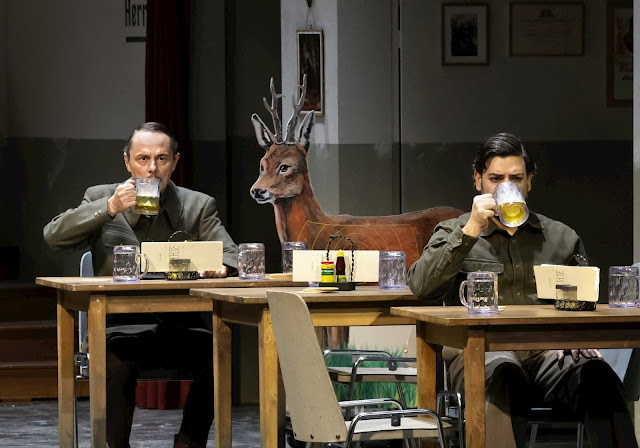 |
| Weber: Der Freischütz – Opening scene – Peter Knaack, Ilker Arcayürek – Opera Ballet Vlaanderen (Photo: Annemie Augustijns) |
The other roles were presented simply as members of the shooting club. Both Karl-Heinz Brandt aas Ottokar and Raimund Nolte as Kuno contributed fine musical performances but we had little sense of their characters. Manuel Winckhler played a combined Hermit/Samiel, a somewhat dubious character whose dramatic purpose was thus uncertain and given a rather ‘dirty old man’ aura by his combination of Mackintosh and bare legs.
What was clear was the Winckhler’s aria, as the Hermit, at the end of the opera unleashed the end of times. Both Max and Agathe went mad, their madness depicted with an old-fashioned and profoundly unsympathetic physicality that I was surprised to see on stage today. Kaspar seemed to join them too. Musically Weber’s finale developed into cacophony as other musical items were overlaid. There was no happy ending, as Raphael Clamer’s character ran around the stage in demented fashion seeming to disassemble things, while all hell broke loose.
The chorus was largely stationary, standing on the set’s stage within a sage and hidden by a curtain when not singing. Musically superb yet dramatically redundant. In the pit, Stephan Zilias (music director of Staatsoper Hannover) drew a finely engaging performance from the orchestra with a notable account of the overture, seeming undaunted by the violence Marthaler wrought on the score.
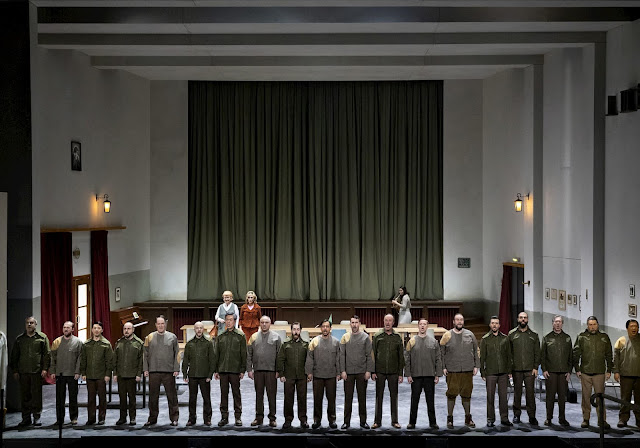 |
| Weber: Der Freischütz – Opera Ballet Vlaanderen (Photo: Annemie Augustijns) |
The production was a missed opportunity. Marthaler did have some interesting ideas but his his failure to trust Weber’s music allied to his largely self-indulgent extra material made this much more of a theatrical event conceived by Marthaler based on Weber rather than a production of the opera itself.
The blog is free, but I’d be delighted if you were to show your appreciation by buying me a coffee.
Elsewhere on this blog
- Power & poetry: all-Prokofiev programme from Igor Levit, Budapest Festival Orchestra, Iván Fischer at Royal Festival Hall – concert review
- The disc is worth getting for the Liszt: throw in Holmès & de Grandval & you have a winner, le vase brisé from Thomas Elwin & Lana Bode – cd review
- Everyone in the group feels strongly about it: Harry Christophers introduces The Sixteen’s 25th Choral Pilgrimage, Angel of Peace – interview
- The cast were clearly having fun whilst the plot was made satisfyingly coherent: Mozart’s The Magic Flute from Charles Court Opera – opera review
- Symphonic Bach: the St Matthew Passion in the glorious Sheldonian Theatre made notable by strong individual performances – concert review
- A very personal vision indeed: Mats Lidström in Bach’s Cello Suites as part of Oxford Philharmonic’s Bach Mendelssohn Festival – concert review
- There was no plan, it just happened: violinist Ada Witczyk on the Růžičková Composition Competition and her New Baroque disc – interview
- Taking us on an emotional journey: Solomon’s Knot in Bach’s 1725 version of the St John Passion at Wigmore Hall – concert review
- Notes of Old: Helen Charlston & Sholto Kynoch draw together a variety of composers, echoing common themes in music that they love – concert review
- Vivid detail & white-hot performances: Gavin Higgins’ Horn Concerto & The Faerie Bride now on disc – record review
- Home



